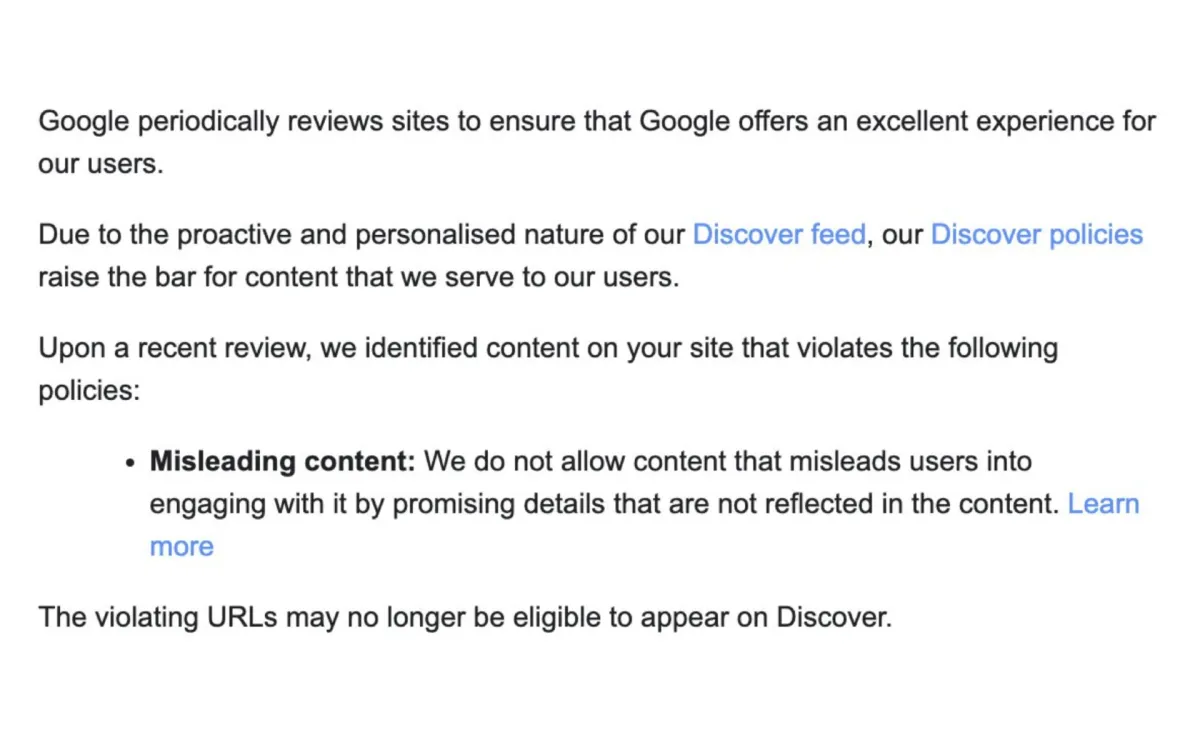
Google this week took action against several publishers by issuing Discover policy violation notices, as reported by digital marketing expert Gagan Ghotra. This development comes in the wake of the August Core Update, which began rolling out earlier this month and has significantly impacted website traffic for numerous online publishers.
According to Ghotra's posts on social media platform X (formerly Twitter), at least seven publishers received notifications from Google regarding content that violates the platform's Discover policies. The timing of these notices is particularly noteworthy, as they coincide with what Ghotra describes as a "brutal" impact of the August Core Update on many websites' visibility in Google Discover.
Ok friends - I got an update - Google is issuing Discover policy violations today. We got this for 7 publishers today - although I can't share site URLs. But for all of the sample violating URLs which Google is highlighting - its a catchy headline/title which is a common practice… https://t.co/eA5b1qvtL7 pic.twitter.com/seRIbHkUL4
— Gagan Ghotra (@gaganghotra_) August 27, 2024
Google Discover, a personalized content feed that appears on the Google app and homepage on mobile devices, has become an increasingly important traffic source for many publishers. The feed algorithmically presents articles, videos, and other content to users based on their interests and search history. However, with this prominence comes increased scrutiny from Google regarding the quality and presentation of content appearing in Discover.
The policy violations cited in the notices primarily relate to misleading content. According to the email shared by Ghotra, Google specifically targets "content that misleads users into engaging with it by promising details that are not reflected in the content." This focus on accuracy and transparency aligns with Google's broader efforts to improve the quality of information presented to users across its various platforms.
Ghotra's observations indicate that the sample violating URLs provided by Google often feature catchy headlines or titles. These attention-grabbing elements, while common practice for improving click-through rates (CTR) in Discover, may now be falling afoul of Google's stricter interpretation of what constitutes misleading content.
The implications of these policy violations can be severe for affected publishers. As stated in the notice, violating URLs may no longer be eligible to appear on Discover. Furthermore, Google warns that additional policy violations could result in more significant penalties, including lower rankings, section-level suspensions, or even domain-level suspensions within the Discover ecosystem.
It's important to note that these actions are specific to Google Discover and do not directly affect how sites or pages appear in regular Search web results. However, the loss of visibility in Discover can represent a substantial traffic reduction for publishers who have come to rely on this channel.
The timing of these notices is particularly significant when considered alongside the broader context of Google's recent algorithm updates. Ghotra reported that between July 31 and August 4, 2024, several publishers experienced a sudden loss of visibility in Discover. This pattern mirrors events from September 2022, following the release of the Helpful Content Update (HCU), when a similar wave of Discover traffic losses was observed.
The August Core Update, which began rolling out on August 20, 2024, appears to have amplified these effects. Ghotra claims knowledge of approximately 14 sites that have been "turned off completely from Discover" in the period from August 20 to August 27. While it's not uncommon for core updates to cause fluctuations in search rankings and traffic, the scale and specificity of the impact on Discover visibility is noteworthy.
Google's actions highlight the company's ongoing efforts to refine and improve the quality of content surfaced through its various platforms. The Discover feed, being a more curated and personalized experience than traditional search results, appears to be subject to particularly stringent quality controls.
For publishers, these developments underscore the importance of adhering strictly to Google's content policies, especially when it comes to presenting accurate and non-misleading information. The focus on headline accuracy suggests that Google's algorithms may be becoming more sophisticated in detecting discrepancies between article titles and their actual content.
The broader implications of these policy enforcements and traffic shifts extend beyond individual publishers. As Discover has grown in importance as a traffic source, many content creators have tailored their strategies to maximize visibility on the platform. This latest wave of enforcement actions may necessitate a reevaluation of these strategies, potentially leading to changes in how content is titled, presented, and optimized for Discover.
It's worth noting that while Ghotra's reports provide valuable insights into these developments, they represent observations from a limited sample of publishers. The full scope and impact of Google's actions may vary across different niches, content types, and geographic regions.
Key facts
Google issued Discover policy violation notices to multiple publishers on August 27, 2024.
At least seven publishers received notifications, according to reports from Gagan Ghotra.
The violations primarily relate to misleading content, particularly focusing on catchy headlines that may not accurately reflect article content.
These notices coincide with the rollout of Google's August Core Update, which began on August 20, 2024.
Approximately 14 sites reportedly lost all visibility in Discover between August 20 and August 27, 2024.
Similar patterns of Discover traffic loss were observed between July 31 and August 4, 2024, and in September 2022 following the Helpful Content Update.
Penalties for policy violations can include removal from Discover, lower rankings, and potential domain-level suspensions within Discover.
These actions are specific to Google Discover and do not directly affect regular Search web results.
The enforcement actions highlight Google's ongoing efforts to improve content quality across its platforms.

